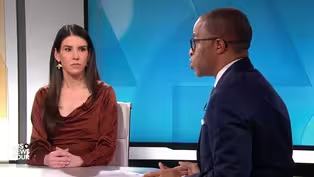
Astronaut who spent a year in space discusses life on Earth
Clip: 1/26/2024 | 7m 13sVideo has Closed Captions
Astronaut who spent a year in space discusses readjusting to life back on Earth
Astronauts of the future could be sent on missions to the moon and Mars that take years, but living in space that long poses all kinds of physical and psychological challenges. NASA is trying to learn as much as it can from astronauts who have spent the most time in space. Science correspondent Miles O'Brien spoke with the American who set the record for longest single space mission.
Problems playing video? | Closed Captioning Feedback
Problems playing video? | Closed Captioning Feedback
Major corporate funding for the PBS News Hour is provided by BDO, BNSF, Consumer Cellular, American Cruise Lines, and Raymond James. Funding for the PBS NewsHour Weekend is provided by...

Astronaut who spent a year in space discusses life on Earth
Clip: 1/26/2024 | 7m 13sVideo has Closed Captions
Astronauts of the future could be sent on missions to the moon and Mars that take years, but living in space that long poses all kinds of physical and psychological challenges. NASA is trying to learn as much as it can from astronauts who have spent the most time in space. Science correspondent Miles O'Brien spoke with the American who set the record for longest single space mission.
Problems playing video? | Closed Captioning Feedback
How to Watch PBS News Hour
PBS News Hour is available to stream on pbs.org and the free PBS App, available on iPhone, Apple TV, Android TV, Android smartphones, Amazon Fire TV, Amazon Fire Tablet, Roku, Samsung Smart TV, and Vizio.
Providing Support for PBS.org
Learn Moreabout PBS online sponsorshipBut living in space that long poses all kinds# of physical and physiological challenges.
So,## NASA is trying to learn as much as it can from# astronauts who've spent the most time in space.
Science correspondent Miles O'Brien spoke with the## American who has set the record# for longest single s MAN: Touchdown.
Touchdown confirmed at 6:17 a.m.# Central time.
Rubio's record ride comes to an end.
MILES O'BRIEN: NASA astronaut Frank Rubio# finally returned to terra firma in September,## 371 days after he launched to the International# Space Station aboard a Russian Soyuz rocket.
It was a record-breaking mission for a U.S.# spacefarer that was not planned.
About three## months after he and his two Russian crewmates# arrived at the station, their Soyuz capsule sprung## a coolant leak, apparently after a micrometeoroid# strike.
They would have to wait for the Russian## Space Agency to build and launch them a new ride# home.
It more than doubled their time in space.
I caught up with Frank Rubio toward the# end of his re-acclamation to life on Earth.
How are things going?
What are# you experiencing right now?
FRANK RUBIO, NASA Astronaut: Yes.
Yes, it' that's gone well and smoothly, which has been a# blessing, and then a lot of physical training.
So,## yes, it's a matter of getting the# muscles and bones back into shape.
MILES O'BRIEN: You're a physician and# also a test subject.
I'm curious what## you have experienced and what the# road to normalcy has been like.
FRANK RUBIO: Yes, so one of the good things is# that we have been doing this for 23 years, right?
And so astronauts early on would lose# up to 20 percent of their bone dens And that's just because you're not getting# the day-to-day pounding on the bones that## standing and walking provide.
And that stressor# actually is really good for An d so when you're missing that,# floating around for a year especially,## that can be hard.
The good thing is that we# have a lot of resistance trai do almost two hours of the day.
And I actually# lost very little bone density because of t because I was able to stay diligent# and consistent on that exercise.
I actually lost a little bit less than# a lot of six-month mission people do,## and that's been great.
MILES O'BRIEN: Would you say yo FRANK RUBIO: Not 100 percent, but I bet I'm pretty## close to 90 to 95 percent.# So I'm feeling really good.
MILES O'BRIEN: So, 23-plus years into the space# station, a lot of lessons have including all that resistance# training that you mentioned.
Is NASA ready to send astronauts on# long-duration missions, ulti FRANK RUBIO: Yes, so I think,# from a human perspective,## we definitely understand what li ke I said, just consistent stressors# applied to the body there and back.
And I think we could certainly do it.
Obviously,## we're not quite there yet from th ere and back.
But I think we could.
It# would be challenging.
But I also think the## motivation for mission success would be# incredibly high for a mission like that.
And so the humans that you put on that mission,# I think, could make it happen, for sure.
MILES O'BRIEN: All right, let's talk# a little bit about the psychology of## being up there.
You expected to# see your f Walk us through how you came# to terms with all of this.
FRANK RUBIO: Yes, Miles, that's a great question.
Fortunately, my background had sort o career.
And so I have had deployments,# and the family's kind of been through that## adjustment of ramping up to the deployment,# having the fortitude to make it through it.
And then, as you know, a lot of our military# often get told, hey, you're staying a little## bit longer than anticipated.
I never got# extended much longer than about a month.
B psychologically, it's really not too# different, whether it's a month or## six months.
And you just -- you definitely# have a It was hard for a few days# or maybe a week.
And then,## after that, you kind of settle in,# you realize that we can do an d the mission has to happen, and# you just kind of set your mind to it.
MILES O'BRIEN: And I know astronauts# have an opportunity on a to have private teleconferences with their# families.
How important was that for you?
FRANK RUBIO: Incredibly important, yes.
And that's## something that I think that's something that we're going to# have to make sure that is present.
Honestly, it makes you feel like you're still# part of the family.
And as lon is doing well, I think most of us can do just# about anything for as long as it's needed.
MILES O'BRIEN: So, aside from family,## one of the things station is fresh food.
And you became quite a# gardener in spac I'm curious how the vegetables you grow in space,## how do they taste?
I mean, after# all, you're not using soil.
FRANK RUBIO: We were supposed to get# half the crop to eat ourselv then send half back for science.
Unfortunately,## because of things not going as expected,# we were supposed to se So, I really didn't get a chance to taste# any of the food that we grew u MILES O'BRIEN: In March, when he was harvesting# some of those tomatoes, he put two in bag and thought he'd Velcroed it firmly# in place.
But it floated away.
He says he## searched for it for hours.
His fellow crewmates# jokingly accused him of eating the produce.
But in December this year, about three# months after he left the station: WOMAN: We might have found something that# someone had been looking for, for quite a MILES O'BRIEN: ... the current crew found# the floating fruit, solving the mystery.
I assume that was a nice moment of exoneration.
FRANK RUBIO: Yes, it was.
And I -- are going to take every opportunity to# make fun of me possible.
So they sure## as heck weren't going to get me out of it# by making up that they found it.
were cherry-sized tomatoes.
And so if we# were going to eat it, we would have had## to split it between seven people.
So it really# wouldn't have been worth it in the fi But, yes, no, it's -- I'm glad they# found it.
I don't know that they're## going to be able to use them for science.
But MILES O'BRIEN: Let's talk about the Russian# partnership here.
It's a complex situation,## of course, with the invasion of Ukraine, which# has cast the partnership in a different light.
Is there much concern about the reliability of# the Russian partnership at this stage of the game?
FRANK RUBIO: Well, our job as a crew# really again is to focus on the mission.
And so my focus was on my two crewmates.
And# they are fantastic human beings le vel.
We really meshed well.
We supported each# other well.
Ultimately, we're on a mission that## it's an incredibly dangerous environment and# our lives depend on each other.
And so you## have to have that trust and you have to have that# relationship built before anything were to happen.
And so, again, despite the differences,# I think it's incredibly important to just## nurture that relationship as much as possible.# And I think we successfully were able to do that.
MILES O'BRIEN: All right, Frank Rubio,# thank you so much for your time.
FRANK RUBIO: Thanks so much, Miles.# Take care.
Good talkin MILES O'BRIEN: Bye-bye.
Alabama conducts nation’s first execution with nitrogen gas
Video has Closed Captions
Clip: 1/26/2024 | 4m 17s | Alabama carries out nation’s first execution with nitrogen gas (4m 17s)
American chemist causes stir in Britain over findings on tea
Video has Closed Captions
Clip: 1/26/2024 | 3m 43s | American chemist causes stir in Britain by suggesting salt can improve cup of tea (3m 43s)
Capehart and Johnson on immigration and the 2024 race
Video has Closed Captions
Clip: 1/26/2024 | 10m 58s | Capehart and Johnson on immigration, Trump's defamation case and the 2024 race (10m 58s)
Jury decides Trump must pay $83.3 million for defamation
Video has Closed Captions
Clip: 1/26/2024 | 4m 51s | Jury decides Trump must pay writer E. Jean Carroll $83.3 million for defamation (4m 51s)
Trump deploys racist tactics as Biden rematch appears likely
Video has Closed Captions
Clip: 1/26/2024 | 6m 28s | Trump deploys racist tactics as Biden rematch appears likely (6m 28s)
UN's top court orders Israel to prevent genocide in Gaza
Video has Closed Captions
Clip: 1/26/2024 | 9m 36s | UN's top court orders Israel to prevent genocide in Gaza (9m 36s)
Providing Support for PBS.org
Learn Moreabout PBS online sponsorship
- News and Public Affairs

FRONTLINE is investigative journalism that questions, explains and changes our world.

- News and Public Affairs

Amanpour and Company features conversations with leaders and decision makers.












Support for PBS provided by:
Major corporate funding for the PBS News Hour is provided by BDO, BNSF, Consumer Cellular, American Cruise Lines, and Raymond James. Funding for the PBS NewsHour Weekend is provided by...





